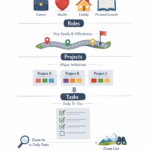
The Importance of Flexible Planning

What is the point in planning your day, week, month or even year, when something unexpected and completely out of your control comes along and blows it out of the water?
You still need to plan, you still need to prioritise… but how can you be flexible and work around these often untimely interruptions?
There are many things that can get in the way of a perfectly planned day or week. In this blog post I aim to discuss the main things that come out of the blue and how you can keep use flexible planning to work around them, whilst still getting your most important tasks completed.
The Main Culprits
-
People
Your friends, family, work colleagues, optometrist, dentist, and any other person you know… Yes, people, these are the biggest culprits for throwing your plans into disarray. It’s not a bad thing – it’s something to be glad about. At least that’s what I have tried to remember. People are the most important things in our lives in my opinion, but they are also the most unpredictable things.
You can wake up with a perfectly planned work schedule, for someone in another team to drop an urgent bombshell at you at 9 am Monday morning (a sure sign their own planning/or their team’s is either non-existent or lacklustre).
-
Weather
Quite an obvious one, but you can plan to do your gardening, play a sport, go for a run etc… And the weather has other ideas.
-
Technology
Normally this hits the hardest in the work setting in my experience. Some software crashes, your VPN won’t connect, or a server error. All things completely out of your control can mean you are unable to work on the things you have planned. Sometimes it can cause urgent issues that end up taking the rest of your day to resolve.
-
Your Mood, Emotion, and Thoughts
Now this is a little controversial. Some would say this is within your control. I personally disagree. Some days no matter what you do, you’re not feeling up to it. Sometimes your thoughts get in the way of what you logically should be doing. Allowing yourself to be flexible when these days or moments occur and appreciating that they happen can be quite freeing.
-
Basic Human Needs
My girlfriend often laughs at my morning routine planned in Tick Tick. I have every task in quite some detail on a tick list. Brushing my teeth, washing my face, flossing, mouthwash, deodorant, shower etc…
It sounds silly but often this time, if not accounted for, gets overlooked. Why am I running out of time in the day? I had ample time in my schedule. Yet I seem to have less time than I thought. Travelling, personal hygiene, eating, urinating, daydreaming, and the list goes on. You certainly don’t need to plan in detail like my morning routine, but I think it’s important to be aware that these things will happen at some point in the day most likely and it can help to realise that this time will eat into your schedule.
How To Utilise Flexible Planning
-
Go Digital, and Utilise it to the Max

For many, productivity apps, to do lists and calendars already make up a big part of their planning process. If it doesn’t for you, and you’re still relying on that paper diary you got free from work or for Christmas – I’d highly recommend you look to move your to do list or calendar to the digital landscape.
The benefits are endless, but let me reel off some of the main ones:
1.) Digital calendars and apps are portable. You can look up what you need within seconds by opening your smartphone. Need to change an appointment time, jot something down, tick off a completed task – no problem.
2.) Easily editable. Did you get the wrong end of the stick? The wrong time? The wrong address? When you’re on paper this can get pretty messy pretty quickly. When you can delete and retype it’s a lot easier.
3.) Links. With more and more information on the internet, chances are you’re going to want to link to a website, or copy a phone number or address quickly. With one click you can call a business from google instead of typing it in your phone from a scribble you made in your diary yesterday.
4.) Visual planning. The simpler your diary is, the better. With a book you have one option – the days of the week and a tiny little bit to write in. With apps like ToDoist and Tick Tick, you can switch between a daily, weekly or monthly view with the tap of your screen. You can drag and drop appointments. It really is infinitely more flexible.
5.) Recurring tasks and reminders. Set up notifications and recurring habits and appointments through productivity apps and calendars. Reminders will ensure you never miss your important to-dos.
Even if you are digital for your planning process. Ask yourself this – are you utilising it to the max? There is an endless amount of software available to speed up and enhance how we plan our lives and projects.
We can now link apps and set up integrations in minutes. Automate your tasks, sync across your devices, and import your Outlook calendar for work and your personal calendar into the same space. There really is no limit to improving the planning process in the digital landscape.
-
Schedule with people in mind and plan strategically

When you schedule your week or schedule time for a project, it is important to plan extra time. Things crop up and eat away at your time, so I advise planning twice as long as you think you’ll need for the important things you must get done.
Further to this plan the things that you must get done, for the times when you know you’ll be free and uninterrupted. If that’s not possible, then plan for the time when you are most likely to want to get it done. Planning intensive tasks after a long day of work is likely setting yourself up for failure. Plan these when you are most refreshed, and get the mindless tasks out of the way when you are not your best (e.g. washing or ironing).
Planning things around social meet-ups or human interaction can often lead to unaccomplished tasks. As mentioned earlier humans are the biggest culprits for throwing your plans into disarray. An event or gathering often ends up lasting far longer than you anticipated – and something urgent can come up that ends up requiring your support, time or advice for another person. Always leave leeway when dealing with people and prepare for the unexpected to arise.
This is one reason I believe getting up early is so beneficial. You can complete tasks with a much lower risk of being interrupted by people, with those interruptions often leaving you no choice but to give your attention and time to them.
-
Developing the ability to reorder your list of to-dos in the blink of an eye.

Becoming unattached from your to-do list is a skill I believe is very worthwhile. By this I mean being able to switch from one thing you really wanted to do, but now cannot – to something else that is within your capacity to do at that moment (even though it might not be the most important or pressing matter).
Often it seems counterintuitive to work on something when you know there is something more important that must be done. And yes it certainly is if you have the ability in that moment to do the most important task. But if you can’t complete that task for a certain reason – move on to the next to do.
In this way, you can make the most of your time and make room to do your important tasks later. For example, you need your laptop to complete an important work task or project but you left it at home. You do however have your phone, which you could use for a variety of important but less urgent tasks. E.g. paying a bill. Get these done and make use of your time which might be otherwise lost.
The same can be said for travelling on trains and buses or getting stuck in a café, service station or airport. Utilising this time in your calendar, instead of writing it off can free up your schedule and give you more quality time back.
Summary
There are many things that are unpredictable, but all you can do is react in the best way possible and set up your plans up to be flexible. In my opinion, utilising technology is the best way possible to stay flexible and adapt to the curveballs life and work throws us. Additionally the strategy and thought behind how we plan can aid us in avoiding the amount of curveballs we are thrown, or at least to reduce the impact of them.
Hopefully, there are some useful tips above, but please feel free to share in the comments anything I have inevitably missed that can help you utilise flexible planning. I am always looking to improve my planning methods and discover new technology.
Leaving it there,
Alex
Download my Excel weekly planner template here















Way cool! Some very valid points! I appreciate you writing
this post and the rest of the website is extremely good.
Hiya! Quick question that’s totally off topic.
Do you know how to make your site mobile friendly?
My blog looks weird when browsing from my apple
iphone. I’m trying to find a template or plugin that might be
able to correct this issue. If you have any suggestions, please
share. Thank you!